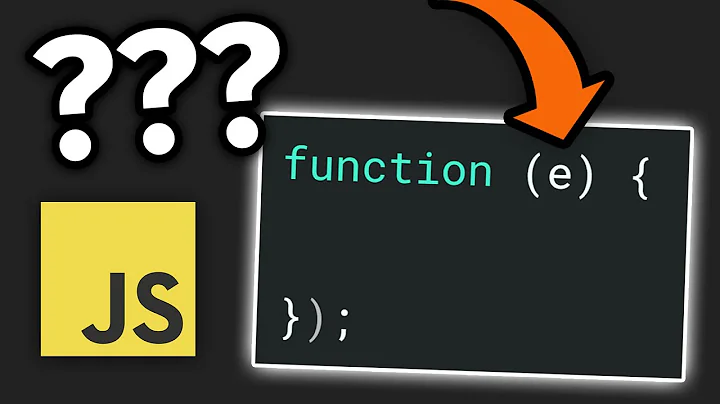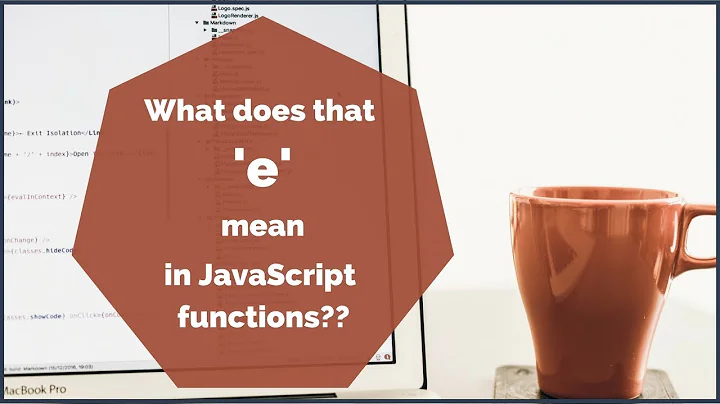What does = +_ mean in JavaScript
Solution 1
r = +_;
-
+tries to cast whatever_is to a number. -
_is only a variable name (not an operator), it could bea,fooetc.
Example:
+"1"
cast "1" to pure number 1.
var _ = "1";
var r = +_;
r is now 1, not "1".
Moreover, according to the MDN page on Arithmetic Operators:
The unary plus operator precedes its operand and evaluates to its operand but attempts to converts it into a number, if it isn't already. [...] It can convert string representations of integers and floats, as well as the non-string values
true,false, andnull. Integers in both decimal and hexadecimal ("0x"-prefixed) formats are supported. Negative numbers are supported (though not for hex). If it cannot parse a particular value, it will evaluate toNaN.
It is also noted that
unary plus is the fastest and preferred way of converting something into a number
Solution 2
It is not an assignment operator.
-
_is just a parameter passed to the function.hexbin.radius = function(_) { // ^ It is passed here // ... }; On the next line
r = +_;+infront casts that variable (_) to a number or integer value and assigns it to variabler
DO NOT CONFUSE IT WITH += operator
Solution 3
=+ are actually two operators = is assignment and + and _ is variable name.
like:
i = + 5;
or
j = + i;
or
i = + _;
My following codes will help you to show use of =+ to convert a string into int.
example:
y = +'5'
x = y +5
alert(x);
outputs 10
use: So here y is int 5 because of =+
otherwise:
y = '5'
x = y +5
alert(x);
outputs 55
Where as _ is a variable.
_ = + '5'
x = _ + 5
alert(x)
outputs 10
Additionally,
It would be interesting to know you could also achieve same thing with ~ (if string is int string (float will be round of to int))
y = ~~'5' // notice used two time ~
x = y + 5
alert(x);
also outputs 10
~ is bitwise NOT : Inverts the bits of its operand. I did twice for no change in magnitude.
Solution 4
It's a sneaky one.
The important thing to understand is that the underscore character here is actually a variable name, not an operator.
The plus sign in front of that is getting the positive numerical value of underscore -- ie effectively casting the underscore variable to be an int. You could achieve the same effect with parseInt(), but the plus sign casting is likely used here because it's more concise.
And that just leaves the equals sign as just a standard variable assignment.
It's probably not deliberately written to confuse, as an experienced Javascript programmer will generally recognise underscore as a variable. But if you don't know that it is definitely very confusing. I certainly wouldn't write it like that; I'm not a fan of short meaningless variable names at the best of times -- If you want short variable names in JS code to save space, use a minifier; don't write it with short variables to start with.
Solution 5
It's not =+. In JavaScript, + means change it into number.
+'32' returns 32.
+'a' returns NaN.
So you may use isNaN() to check if it can be changed into number.
Related videos on Youtube
Dimitry
Tech-leader with fifteen years of experience of setting and leading the tech vision, creating products,architecture and building effective teams (remote and local). Enjoy working on challenging problems, applying ML and Deep Learning, and building products that users love. Blog:Mentful.com Current:Cortex Past:Roundtown and DataXu Some projects: D3 Gantt-Chart Cool D3, Example
Updated on August 15, 2020Comments
-
 Dimitry over 3 years
Dimitry over 3 yearsI was wondering what the = +_ operator means in JavaScript. It looks like it does assignments.
Example:
hexbin.radius = function(_) { if (!arguments.length) return r; r = +_; dx = r * 2 * Math.sin(Math.PI / 3); dy = r * 1.5; return hexbin; };-
 Oleg about 11 yearsReminded me of the good old approach operator
Oleg about 11 yearsReminded me of the good old approach operator--> -
glglgl about 11 yearsWhat now -
=+or+_? Please be clear about what you try to ask. -
 Kobi about 11 yearsThere is no "
Kobi about 11 yearsThere is no "=+" in the question. There's "= +", which is very different.+ =would not have worked either, that's a syntax error - you cannot ignore spaces here. -
 Pieter Witvoet about 11 yearsThe + here is a unary operator, with _ as its operand.
Pieter Witvoet about 11 yearsThe + here is a unary operator, with _ as its operand. -
Garfield about 11 yearsIt's just the negative or positive value as in maths (+10 - positive number), (-10 - negative number). No fancy!
-
Michael Wild about 11 yearsLooks like a Perl programmer couldn't let go of the default variable ;-)
-
 MC Emperor about 11 yearsJust like
MC Emperor about 11 yearsJust like$is a valid Java and Javascript identifier, while you just came from PHP programming. Confusing. Ninja it is! -
 hugo der hungrige about 11 yearsA good syntax-highlighting would have helped you to answer the question.
hugo der hungrige about 11 yearsA good syntax-highlighting would have helped you to answer the question. -
Starx about 11 yearsWonder what the close vote is about?
-
Grijesh Chauhan about 11 yearsOk, here is good read: Javascript Type-Conversion Second is Type Casting In Javascript
-
Konrad Viltersten about 11 yearsOh, this was one freaky syntax. Never seen that before and it's got a coolness value of at least 98%. I'm going to use it in the next script just to make people scratch their eyes. :D
-
vidya sagar about 11 yearsI wonder why someone would use just an underscore(
_) as a variable. Is it to make people scratch their heads while reading his code or he's being simplistic, to reduce the number of chars of the source code? o.O -
 Admin about 11 yearsi hate this kind of variable naming, he/she should be idiot to give such name.
Admin about 11 yearsi hate this kind of variable naming, he/she should be idiot to give such name. -
 tckmn over 10 yearsYou can make a smiley face
tckmn over 10 yearsYou can make a smiley facex= +_+ 0; -
nawfal over 10 yearspossible duplicate of What does the plus sign do in 'return +new Date'
-
-
colincameron about 11 yearsDoes + really mean cast to a number, or does
+_really mean0+_, in which case_must be cast before adding to 0? -
lonesomeday about 11 years@c.cam108 See the MDN page on the unary plus operator.
-
 Kobi about 11 years@c.cam108 - No, they do not behave similarly. Unary plus casts the value to a number, but binary plus does not:
Kobi about 11 years@c.cam108 - No, they do not behave similarly. Unary plus casts the value to a number, but binary plus does not:+'12' === 12(result is a number), but0 + '12' === '012'(result is a string). Note, however, that0 - '12' === -12. -
TRiG about 11 years+1, as you're the only one here to explicitly point out that
_is a variable. -
 Mathletics about 11 years@TRiG what about Starx' answer, which does so without being tl;dr?
Mathletics about 11 years@TRiG what about Starx' answer, which does so without being tl;dr? -
Izkata about 11 years@juzerali Sure, but that's not good practice. Try using addition ;)
-
 Matthew Lock about 11 yearsLooks perlish with perl's default variable $_
Matthew Lock about 11 yearsLooks perlish with perl's default variable $_ -
Attila O. about 11 yearsYou forgot a
+before theb. -
Aki Suihkonen about 11 yearsI use often
x|0to convert double to int; however this as well as using '~' has the penalty of restricting to numbers < 2^32. +"2e15" does not. -
Grijesh Chauhan about 11 years@AkiSuihkonen Yes good I believe
x|0is even faster then+. Correct ? nice technique :). (2) I use~just to show OP that+is not only a sign can be use (i myself use+). -
Grijesh Chauhan about 11 years@Alvin Wong I think
X | 0will be faster then+, not ? -
Aki Suihkonen about 11 yearsHard to say -- there's jsperf though is one want's to measure it. OTOH these two operators have a complete different meaning. If only requiring a number (and not integer) '+' is anyway one character shorter.
-
Grijesh Chauhan about 11 years@AkiSuihkonen actually bitwise operators are faster then any other operator. that is the reason!
-
Aki Suihkonen about 11 yearsActually I just tested it jsperf -- 18M ops for '|0', 19M ops for '+'; the performance will probably vary from browser to browser. jsperf.com/strtoint
-
Alvin Wong about 11 years@GrijeshChauhan
+is faster becauseit does not perform any other operations on the number(MDN) Also, bitwise OR|only results in an signed integer. -
Juzer Ali about 11 years@Izkata: I know it will concatenate the strings.
-
J.G.Sebring about 11 years@AkiSuihkonen Oh my, just did the jsperf test in Firefox, huge difference..
|alot faster. -
Grijesh Chauhan about 11 years@AlvinWong I don't think so.
|is much faster. on most browser. may be slow on IE. -
Alvin Wong about 11 years@GrijeshChauhan Unary
+converts toNumberbut|only result in 32-bit signed integer. -
Grijesh Chauhan about 11 years@AlvinWong Yes true! :)
-
Grijesh Chauhan almost 11 yearsI think in first line you wants to say
parseInr(_)instead ofparseFloat(_)? -
 Brian almost 11 yearsNo I meant
Brian almost 11 yearsNo I meantfloat, because parseInt will stop at non numeric character, parshFloat will not. EXP:parseFloat(2.4) = 2.4vsparseInt(2.4) = 2. -
 Soner from The Ottoman Empire about 4 yearsString concatenation and conversion is a special feature of the binary plus +. Other arithmetic operators work only with numbers and always convert their operands to numbers.
Soner from The Ottoman Empire about 4 yearsString concatenation and conversion is a special feature of the binary plus +. Other arithmetic operators work only with numbers and always convert their operands to numbers.








